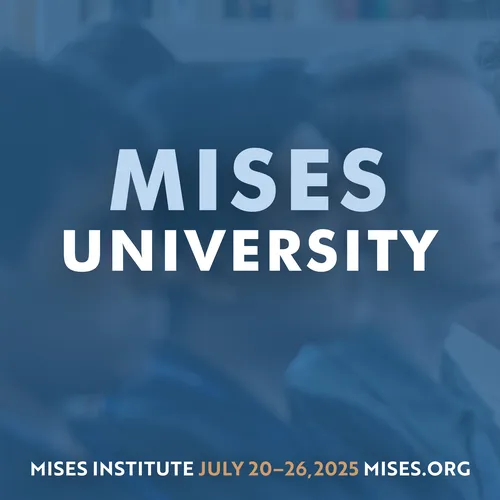
Mises U 2025
Mises University is the world’s leading instructional program in the Austrian school of economics. Recordings of the lectures and seminars presented at the Mises Institute, July 20–26, 2025.
- Update frequency
- every day
- Episodes
- 41
- Years Active
- 2024 - 2025

Competition and Monopoly
Competition is a relentless, dynamic process of entrepreneurship and discovery. Tom DiLorenzo exposes how antitrust laws, rooted in flawed theories of monopoly and “perfect competition,” have served …

The Austrian Theory of the Business Cycle
Paul Cwik unpacks Austrian Business Cycle Theory, explaining how artificial credit expansion triggers unsustainable booms and inevitable busts. He walks through models of savings, investment, and the…

Austrian Capital Theory
Patrick Newman introduces Austrian capital theory: how savings, time, and production structures drive economic growth. Without capital goods and roundabout production, we’d still be living like primi…

Calculation and Socialism
A modern socialist economy is impossible.
Recorded at the Mises Institute in Auburn, Alabama, on July 22, 2025.
Mises University is the world's leading instructional program in the Austrian School of e…

The Theory of Interest
Dr. Jeffrey Herbener explains how time preference shapes interest rates, production, and investment, making time central to economic coordination and prosperity.
Recorded at the Mises Institute in Aub…

Banking
David Howden reveals how banking, especially fractional reserves and central bank manipulations, creates instability and inflation. He also explains why a 100% reserve system could prevent crises, an…

Money
Dr. Sandy Klein walks through the origins and essential functions of money, showing how barter’s pitfalls led to the spontaneous emergence of money as a medium of exchange. She explains Menger's and …

Subjective Value and Market Prices
Jeffrey Herbener explains how Austrian price theory reveals the logic of voluntary exchange and subjective value, and why market prices emerge not from production costs, but from personal preferences…

Praxeology
"The word praxeology can be used in two different ways. One is for a science of human action, as developed by Ludwig von Mises and his successors, principally Murray Rothbard. And the other is for th…

The Birth of the Austrian School
Professor Salerno traces the birth of the Austrian School to Carl Menger’s revolutionary insight: prices emerge from human wants, choices, and the subjective value of each unit consumed.
Recorded at t…

Austrian Economics in the Age of MAGA
The right dismisses economics at its peril. Tom Woods shows why Austrian economics holds the key to solving the very cultural and economic crises that MAGA claims to care about.
Recorded at the Mises …

Five Myths About the History of Political Thought
Ryan McMaken explores five enduring myths in the history of political thought, drawing on Ralph Raico’s The Struggle for Liberty to challenge conventional takes on Rousseau, John Stuart Mill, constit…

Zoomers: America’s Most Persecuted Minority
Tho Bishop delivers a defense of Gen Z, arguing that they are bearing the brunt of decades of fiscal irresponsibility, inflationary policy, and political neglect. With historical insight and Rothbard…

Rothbardian Insights on the Political Economy of Mass Media
Connor O’Keeffe applies Rothbardian insights to expose how the news media distorts reality, not because of markets, but because of its entanglement with the state. From access-driven censorship to de…

Debate: Higher Tariff Taxes Will Create Prosperity
Hosted live at Mises Unviversity 2025, Spencer Morrison, author of Reshore: How Tariffs Will Bring Our Jobs Home, faces off with economist Murray Sabrin over the economic merits and pitfalls of tarif…

Faculty Panel: Theory and Method
What’s the real foundation of a free and prosperous society—state control or individual liberty? In this dynamic faculty panel, leading Austrian economists challenge mainstream economic dogmas, from …

Faculty Panel: Policy and History
What's the best historical example of a truly libertarian society—and what’s the biggest obstacle facing liberty today? In this faculty panel, Mises Institute scholars answer tough questions on taxat…

Equilibrium Illusions
Jonathan Newman challenges mainstream interpretations of equilibrium, showing how Austrian economics replaces static models with a dynamic, step-by-step view of market coordination. Drawing on Mises,…

Tariffs versus Free Trade
Patrick Newman exposes tariffs as economic distortions that harm consumers and misallocate resources. Drawing on Austrian insights, he debunks protectionist myths and makes the case for free trade ov…

Entrepreneurship
Entrepreneurs are the market’s driving force: risk-takers who organize capital and labor to meet uncertain consumer needs. Without them, there is no market economy.
Recorded at the Mises Institute in …